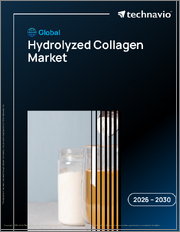
|
시장보고서
상품코드
1703364
콜라겐 시장 : 산업 규모, 점유율, 동향, 기회, 예측, 제품별, 공급원별, 용도별, 지역별, 경쟁별(2020-2030년)Collagen Market - Global Industry Size, Share, Trends, Opportunity & Forecast, Segmented By Product, By Source, By Application, By Region & Competition, 2020-2030F |
||||||
콜라겐 세계 시장 규모는 2024년 93억 달러로 평가되었고, 2030년까지 예측 기간 동안 연평균 4.15%의 꾸준한 성장이 예상됩니다.
다양한 산업 분야에서 콜라겐의 사용이 급증하는 배경에는 영양가 높은 제품의 소비에 대한 매력이 증가하고 있기 때문입니다. 콜라겐은 체내 세포 외 기질에서 추출한 섬유질 구조의 단백질로, 헬스케어 분야에서 인기를 얻고 있습니다. 콜라겐 기반 제품에 대한 수요는 재료의 발전과 함께 예측 기간 동안 시장 성장의 주요 원동력이 될 것입니다.
| 시장 개요 | |
|---|---|
| 예측 기간 | 2026-2030년 |
| 시장 규모 : 2024년 | 93억 달러 |
| 시장 규모 : 2030년 | 119억 달러 |
| CAGR : 2025-2030년 | 4.15% |
| 급성장 부문 | 젤라틴 |
| 최대 시장 | 북미 |
식품에 콜라겐을 사용하는 것도 시장의 급격한 확대에 기여하고 있습니다. 이 단백질은 주로 불용성이며 글리세린, 아르기닌, 아미노산의 도움으로 합성됩니다. 그 유익한 효과는 뇌세포의 건강 증진과 뼈 조직 유지, 뼈 손실 예방에 도움이 되는 것으로 알려져 있습니다. 콜라겐은 또한 머리카락과 손톱과 같은 케라틴을 포함하는 신체 부위의 품질을 향상시키는 데 중요한 역할을 합니다.
또한, 피부 조직 세포의 탄력과 강도를 지원하여 피부의 전반적인 품질 향상에 기여합니다. 그러나 특정 종교적 관습에서는 동물 유래 제품의 사용을 금지하고 있어 시장 성장의 잠재적 장벽으로 작용하고 있습니다. 또한, 특히 신흥국에서는 가공 기술이 부족하다는 점도 시장 성장에 걸림돌로 작용하고 있습니다. 이러한 문제를 해결하고 콜라겐의 잠재적 용도와 이점을 더욱 확대하는 것이 예측 기간 동안 지속적인 성장을 위해 매우 중요합니다.
시장 성장 촉진요인
화장품 산업에서 콜라겐 수요 증가
주요 시장 이슈
조달과 지속가능성 부족
주요 시장 동향
추출 및 정제 기술의 발전
목차
제1장 개요
제2장 조사 방법
제3장 주요 요약
제4장 고객의 소리
제5장 콜라겐 시장 전망
- 시장 규모와 예측
- 금액별
- 시장 점유율과 예측
- 제품별(젤라틴, 가수분해 콜라겐, 천연 콜라겐, 합성 콜라겐, 기타)
- 원료별(소, 돼지, 닭, 해산물, 기타)
- 용도별(식품 및 음료, 헬스케어, 화장품, 기타)
- 지역별
- 기업별(2024년)
- 시장 맵
제6장 북미의 콜라겐 시장 전망
- 시장 규모와 예측
- 시장 점유율과 예측
- 북미 : 국가별 분석
- 미국
- 캐나다
- 멕시코
제7장 유럽의 콜라겐 시장 전망
- 시장 규모와 예측
- 시장 점유율과 예측
- 유럽 : 국가별 분석
- 독일
- 영국
- 이탈리아
- 프랑스
- 스페인
제8장 아시아태평양의 콜라겐 시장 전망
- 시장 규모와 예측
- 시장 점유율과 예측
- 아시아태평양 : 국가별 분석
- 중국
- 인도
- 일본
- 한국
- 호주
제9장 남미의 콜라겐 시장 전망
- 시장 규모와 예측
- 시장 점유율과 예측
- 남미 : 국가별 분석
- 브라질
- 아르헨티나
- 콜롬비아
제10장 중동 및 아프리카의 콜라겐 시장 전망
- 시장 규모와 예측
- 시장 점유율과 예측
- 중동 및 아프리카 : 국가별 분석
- 남아프리카공화국
- 사우디아라비아
- 아랍에미리트(UAE)
제11장 시장 역학
- 성장 촉진요인
- 과제
제12장 시장 동향과 발전
- 최근 동향
- 제품 출시
- 인수합병(M&A)
제13장 세계의 콜라겐 시장 : SWOT 분석
제14장 경쟁 구도
- Collagen Matrix, Inc.
- Collagen Solutions Plc
- Tessenderlo Group
- GELITA AG
- Weishardt Holding SA
- ConnOils LLC
- Advanced BioMatrix, Inc.
- Nitta Gelatin, NA Inc.
- Junca Gelatines SL
- Symatese SASU
제15장 전략적 제안
제16장 리서치사에 대해 & 면책사항
LSH 25.04.25Global Collagen Market was valued at USD 9.30 Billion in 2024 and is anticipated to project steady growth in the forecast period with a CAGR of 4.15% through 2030. The rapid growth in the use of collagen in various industries is driven by the increasing attraction towards the consumption of nutritious products. Collagen, a protein with a fibrous structure obtained from the extracellular matrix in the body, has gained popularity in the healthcare sector. The demand for collagen-based products, coupled with advancements in materials, serves as a major driving force for market growth during the forecast period.
| Market Overview | |
|---|---|
| Forecast Period | 2026-2030 |
| Market Size 2024 | USD 9.30 Billion |
| Market Size 2030 | USD 11.90 Billion |
| CAGR 2025-2030 | 4.15% |
| Fastest Growing Segment | Gelatin |
| Largest Market | North America |
The use of collagen in food products has also contributed to its rapid market expansion. This protein, mainly insoluble in nature, is synthesized with the help of glycerine, arginine, and amino acids. Its beneficial effects are observed in the promotion of brain cell health and the maintenance of bone tissue, preventing bone loss. Collagen also plays a significant role in enhancing the quality of keratin-containing body parts, such as hair and nails.
Moreover, it supports the elasticity and strength of skin tissue cells, contributing to the overall quality of the skin. However, certain religious practices prohibit the use of animal-sourced products, posing a potential barrier to market growth. Additionally, inadequate processing technologies, particularly in developing countries, present a challenge for the market. Addressing these challenges and further exploring the potential applications and benefits of collagen will be crucial for its sustained growth in the forecast period.
Key Market Drivers
Growing Demand of Collagen in Cosmetic Industry
Collagen, a vital component responsible for maintaining the firmness, suppleness, and youthfulness of our skin, plays a crucial role in our skincare routine. As we age, the natural production of collagen in our bodies diminishes, leading to the appearance of fine lines, wrinkles, and sagging skin. However, the cosmetic industry has recognized the power of collagen and harnessed its potential in various skincare and beauty products to combat these signs of aging. The remarkable ability of collagen to restore moisture and elasticity makes it an ideal ingredient in anti-aging skincare products.
By replenishing the collagen levels in the skin, these products not only help reduce the appearance of wrinkles and fine lines but also improve skin texture, promoting a more youthful complexion. It's no wonder that collagen has become a sought-after ingredient, finding its way into serums, creams, masks, and other skincare formulations. Moreover, collagen exhibits exceptional hydrating properties that significantly enhance the skin's moisture retention capabilities. When topically applied, collagen-based products create a protective barrier on the skin, preventing moisture loss and ensuring that the skin remains hydrated and plump. This enhanced hydration not only improves skin texture but also imparts a radiant and dewy appearance.
Furthermore, addressing the loss of skin elasticity, a common concern as we age, collagen-based products are known to boost the skin's elasticity, making it appear firmer and more toned. These products help restore the natural elasticity of the skin, reducing sagging and promoting a more youthful and rejuvenated appearance. Collagen's ability to strengthen the skin's structure has made it an indispensable ingredient in creams and lotions specifically targeting skin firmness and elasticity.
The increasing consumer awareness about skincare ingredients and their benefits has played a significant role in the surging demand for collagen-based cosmetics. People are now more educated and proactive in seeking out products that contain collagen to promote a healthy and youthful complexion. This growing consumer awareness and preference for collagen have become major driving forces behind the thriving global collagen market. In conclusion, collagen's invaluable contributions to skincare and beauty cannot be overstated.
From its role in maintaining firmness and suppleness to its ability to restore moisture and elasticity, collagen has become a cornerstone of effective anti-aging skincare. Its popularity continues to grow as more individuals recognize and appreciate the remarkable benefits that collagen-based products can offer for achieving and maintaining a youthful and radiant complexion.
Key Market Challenges
Lack of Sourcing and Sustainability
Climate uncertainties, such as overfishing, habitat destruction, and pollution, pose significant challenges to responsible sourcing practices within the collagen industry. These factors can lead to resource depletion, loss of biodiversity, and disrupt marine ecosystems. Efforts must be made to ensure sustainable fishing practices and minimize the environmental impact associated with collagen sourcing.
Furthermore, the collagen industry faces challenges related to the lack of standardized practices and regulations for responsible sourcing. Without clear guidelines, it becomes difficult to ensure that collagen suppliers adhere to sustainable and ethical practices consistently. Implementing global standards and certifications can help address this issue, providing transparency and assurance to consumers.
By establishing comprehensive guidelines for responsible sourcing, the industry can mitigate the negative environmental consequences and promote sustainable practices across the collagen supply chain. In addition to environmental concerns, responsible sourcing also encompasses social responsibility and labor practices. The collagen industry must prioritize fair trade, safe working conditions, and the protection of workers' rights. By upholding ethical practices throughout the supply chain, collagen manufacturers can contribute to the well-being of workers and the communities they operate in. Ensuring social responsibility not only enhances the long-term sustainability of the industry but also safeguards its reputation and builds trust among consumers.
In summary, the collagen industry faces multifaceted challenges in achieving responsible sourcing practices. Taking into account environmental sustainability, standardized guidelines, and social responsibility, it is crucial for the industry to adopt comprehensive approaches that prioritize the health of the planet, ethical practices, and the well-being of workers. By doing so, the collagen industry can thrive in a sustainable manner and meet the growing demand while preserving the integrity of the ecosystems it depends on.
Key Market Trends
Advancements in Extraction and Purification Technologies
Technological advancements have revolutionized the extraction of collagen, optimizing the yield obtained from raw materials such as animal by-products and marine sources. These cutting-edge methods, including enzymatic hydrolysis, ultrasound-assisted extraction, and high-pressure processing, have been developed to enhance efficiency and maximize collagen extraction. As a result, waste is minimized, and the utilization of resources is improved, leading to higher collagen yields.
Moreover, modern technologies not only increase extraction efficiency but also ensure the preservation of collagen's functional properties during the extraction process. The integrity of collagen's unique triple-helix structure and its bioactive properties are crucial for its efficacy in various applications like skincare, wound healing, and tissue engineering. Gentle extraction techniques have been developed to maintain the functionality and bioavailability of the extracted collagen, further enhancing its potential in diverse fields. The purification of collagen is a critical step in producing high-quality collagen.
Technological advancements in filtration and separation processes have led to improved purification techniques that effectively remove impurities such as fats, pigments, and other proteins from the extracted collagen. These advanced methods guarantee the production of pure collagen with enhanced quality, making it suitable for a wide range of applications in the pharmaceutical, cosmetic, and food industries.
In the domain of collagen purification, chromatography and electrophoresis techniques have played a significant role. These sophisticated methods enable the separation and isolation of specific collagen types and their components, such as peptides and amino acids, based on their unique properties. By selectively isolating and purifying desired collagen fractions, researchers can tailor collagen products to meet specific requirements, providing new possibilities for customization and application development.
Key Market Players
- Collagen Matrix, Inc.
- Collagen Solutions Plc
- Tessenderlo Group
- GELITA AG
- Weishardt Holding SA
- ConnOils LLC
- Advanced BioMatrix, Inc.
- Nitta Gelatin, NA Inc.
- Junca Gelatines SL
- Symatese SASU
Report Scope:
In this report, the Global Collagen Market has been segmented into the following categories, in addition to the industry trends which have also been detailed below:
Collagen Market, By Product:
- Gelatin
- Hydrolyzed Collagen
- Native Collagen
- Synthetic Collagen
- Others
Collagen Market, By Source:
- Bovine
- Porcine
- Poultry
- Marine
- Others
Collagen Market, By Application:
- Food and Beverages
- Healthcare
- Cosmetics
- Others
Collagen Market, By Region:
- North America
- United States
- Canada
- Mexico
- Europe
- France
- United Kingdom
- Italy
- Germany
- Spain
- Asia-Pacific
- China
- India
- Japan
- Australia
- South Korea
- South America
- Brazil
- Argentina
- Colombia
- Middle East & Africa
- South Africa
- Saudi Arabia
- UAE
Competitive Landscape
Company Profiles: Detailed analysis of the major companies present in the Global Collagen Market.
Available Customizations:
Global Collagen Market report with the given market data, TechSci Research offers customizations according to a company's specific needs. The following customization options are available for the report:
Company Information
- Detailed analysis and profiling of additional market players (up to five).
Table of Contents
1. Product Overview
- 1.1. Market Definition
- 1.2. Scope of the Market
- 1.2.1. Markets Covered
- 1.2.2. Years Considered for Study
- 1.2.3. Key Market Segmentations
2. Research Methodology
- 2.1. Objective of the Study
- 2.2. Baseline Methodology
- 2.3. Key Industry Partners
- 2.4. Major Association and Secondary Sources
- 2.5. Forecasting Methodology
- 2.6. Data Triangulation & Validation
- 2.7. Assumptions and Limitations
3. Executive Summary
- 3.1. Overview of the Market
- 3.2. Overview of Key Market Segmentations
- 3.3. Overview of Key Market Players
- 3.4. Overview of Key Regions/Countries
- 3.5. Overview of Market Drivers, Challenges, Trends
4. Voice of Customer
5. Collagen Market Outlook
- 5.1. Market Size & Forecast
- 5.1.1. By Value
- 5.2. Market Share & Forecast
- 5.2.1. By Product (Gelatin, Hydrolyzed Collagen, Native Collagen, Synthetic Collagen, Others)
- 5.2.2. By Source (Bovine, Porcine, Poultry, Marine, Others)
- 5.2.3. By Application (Food and Beverages, Healthcare, Cosmetics, Others)
- 5.2.4. By Region
- 5.2.5. By Company (2024)
- 5.3. Market Map
6. North America Collagen Market Outlook
- 6.1. Market Size & Forecast
- 6.1.1. By Value
- 6.2. Market Share & Forecast
- 6.2.1. By Product
- 6.2.2. By Source
- 6.2.3. By Application
- 6.2.4. By Country
- 6.3. North America: Country Analysis
- 6.3.1. United States Collagen Market Outlook
- 6.3.1.1. Market Size & Forecast
- 6.3.1.1.1. By Value
- 6.3.1.2. Market Share & Forecast
- 6.3.1.2.1. By Product
- 6.3.1.2.2. By Source
- 6.3.1.2.3. By Application
- 6.3.1.1. Market Size & Forecast
- 6.3.2. Canada Collagen Market Outlook
- 6.3.2.1. Market Size & Forecast
- 6.3.2.1.1. By Value
- 6.3.2.2. Market Share & Forecast
- 6.3.2.2.1. By Product
- 6.3.2.2.2. By Source
- 6.3.2.2.3. By Application
- 6.3.2.1. Market Size & Forecast
- 6.3.3. Mexico Collagen Market Outlook
- 6.3.3.1. Market Size & Forecast
- 6.3.3.1.1. By Value
- 6.3.3.2. Market Share & Forecast
- 6.3.3.2.1. By Product
- 6.3.3.2.2. By Source
- 6.3.3.2.3. By Application
- 6.3.3.1. Market Size & Forecast
- 6.3.1. United States Collagen Market Outlook
7. Europe Collagen Market Outlook
- 7.1. Market Size & Forecast
- 7.1.1. By Value
- 7.2. Market Share & Forecast
- 7.2.1. By Product
- 7.2.2. By Source
- 7.2.3. By Application
- 7.2.4. By Country
- 7.3. Europe: Country Analysis
- 7.3.1. Germany Collagen Market Outlook
- 7.3.1.1. Market Size & Forecast
- 7.3.1.1.1. By Value
- 7.3.1.2. Market Share & Forecast
- 7.3.1.2.1. By Product
- 7.3.1.2.2. By Source
- 7.3.1.2.3. By Application
- 7.3.1.1. Market Size & Forecast
- 7.3.2. United Kingdom Collagen Market Outlook
- 7.3.2.1. Market Size & Forecast
- 7.3.2.1.1. By Value
- 7.3.2.2. Market Share & Forecast
- 7.3.2.2.1. By Product
- 7.3.2.2.2. By Source
- 7.3.2.2.3. By Application
- 7.3.2.1. Market Size & Forecast
- 7.3.3. Italy Collagen Market Outlook
- 7.3.3.1. Market Size & Forecast
- 7.3.3.1.1. By Value
- 7.3.3.2. Market Share & Forecast
- 7.3.3.2.1. By Product
- 7.3.3.2.2. By Source
- 7.3.3.2.3. By Application
- 7.3.3.1. Market Size & Forecast
- 7.3.4. France Collagen Market Outlook
- 7.3.4.1. Market Size & Forecast
- 7.3.4.1.1. By Value
- 7.3.4.2. Market Share & Forecast
- 7.3.4.2.1. By Product
- 7.3.4.2.2. By Source
- 7.3.4.2.3. By Application
- 7.3.4.1. Market Size & Forecast
- 7.3.5. Spain Collagen Market Outlook
- 7.3.5.1. Market Size & Forecast
- 7.3.5.1.1. By Value
- 7.3.5.2. Market Share & Forecast
- 7.3.5.2.1. By Product
- 7.3.5.2.2. By Source
- 7.3.5.2.3. By Application
- 7.3.5.1. Market Size & Forecast
- 7.3.1. Germany Collagen Market Outlook
8. Asia-Pacific Collagen Market Outlook
- 8.1. Market Size & Forecast
- 8.1.1. By Value
- 8.2. Market Share & Forecast
- 8.2.1. By Product
- 8.2.2. By Source
- 8.2.3. By Application
- 8.2.4. By Country
- 8.3. Asia-Pacific: Country Analysis
- 8.3.1. China Collagen Market Outlook
- 8.3.1.1. Market Size & Forecast
- 8.3.1.1.1. By Value
- 8.3.1.2. Market Share & Forecast
- 8.3.1.2.1. By Product
- 8.3.1.2.2. By Source
- 8.3.1.2.3. By Application
- 8.3.1.1. Market Size & Forecast
- 8.3.2. India Collagen Market Outlook
- 8.3.2.1. Market Size & Forecast
- 8.3.2.1.1. By Value
- 8.3.2.2. Market Share & Forecast
- 8.3.2.2.1. By Product
- 8.3.2.2.2. By Source
- 8.3.2.2.3. By Application
- 8.3.2.1. Market Size & Forecast
- 8.3.3. Japan Collagen Market Outlook
- 8.3.3.1. Market Size & Forecast
- 8.3.3.1.1. By Value
- 8.3.3.2. Market Share & Forecast
- 8.3.3.2.1. By Product
- 8.3.3.2.2. By Source
- 8.3.3.2.3. By Application
- 8.3.3.1. Market Size & Forecast
- 8.3.4. South Korea Collagen Market Outlook
- 8.3.4.1. Market Size & Forecast
- 8.3.4.1.1. By Value
- 8.3.4.2. Market Share & Forecast
- 8.3.4.2.1. By Product
- 8.3.4.2.2. By Source
- 8.3.4.2.3. By Application
- 8.3.4.1. Market Size & Forecast
- 8.3.5. Australia Collagen Market Outlook
- 8.3.5.1. Market Size & Forecast
- 8.3.5.1.1. By Value
- 8.3.5.2. Market Share & Forecast
- 8.3.5.2.1. By Product
- 8.3.5.2.2. By Source
- 8.3.5.2.3. By Application
- 8.3.5.1. Market Size & Forecast
- 8.3.1. China Collagen Market Outlook
9. South America Collagen Market Outlook
- 9.1. Market Size & Forecast
- 9.1.1. By Value
- 9.2. Market Share & Forecast
- 9.2.1. By Product
- 9.2.2. By Source
- 9.2.3. By Application
- 9.2.4. By Country
- 9.3. South America: Country Analysis
- 9.3.1. Brazil Collagen Market Outlook
- 9.3.1.1. Market Size & Forecast
- 9.3.1.1.1. By Value
- 9.3.1.2. Market Share & Forecast
- 9.3.1.2.1. By Product
- 9.3.1.2.2. By Source
- 9.3.1.2.3. By Application
- 9.3.1.1. Market Size & Forecast
- 9.3.2. Argentina Collagen Market Outlook
- 9.3.2.1. Market Size & Forecast
- 9.3.2.1.1. By Value
- 9.3.2.2. Market Share & Forecast
- 9.3.2.2.1. By Product
- 9.3.2.2.2. By Source
- 9.3.2.2.3. By Application
- 9.3.2.1. Market Size & Forecast
- 9.3.3. Colombia Collagen Market Outlook
- 9.3.3.1. Market Size & Forecast
- 9.3.3.1.1. By Value
- 9.3.3.2. Market Share & Forecast
- 9.3.3.2.1. By Product
- 9.3.3.2.2. By Source
- 9.3.3.2.3. By Application
- 9.3.3.1. Market Size & Forecast
- 9.3.1. Brazil Collagen Market Outlook
10. Middle East and Africa Collagen Market Outlook
- 10.1. Market Size & Forecast
- 10.1.1. By Value
- 10.2. Market Share & Forecast
- 10.2.1. By Product
- 10.2.2. By Source
- 10.2.3. By Application
- 10.2.4. By Country
- 10.3. MEA: Country Analysis
- 10.3.1. South Africa Collagen Market Outlook
- 10.3.1.1. Market Size & Forecast
- 10.3.1.1.1. By Value
- 10.3.1.2. Market Share & Forecast
- 10.3.1.2.1. By Product
- 10.3.1.2.2. By Source
- 10.3.1.2.3. By Application
- 10.3.1.1. Market Size & Forecast
- 10.3.2. Saudi Arabia Collagen Market Outlook
- 10.3.2.1. Market Size & Forecast
- 10.3.2.1.1. By Value
- 10.3.2.2. Market Share & Forecast
- 10.3.2.2.1. By Product
- 10.3.2.2.2. By Source
- 10.3.2.2.3. By Application
- 10.3.2.1. Market Size & Forecast
- 10.3.3. UAE Collagen Market Outlook
- 10.3.3.1. Market Size & Forecast
- 10.3.3.1.1. By Value
- 10.3.3.2. Market Share & Forecast
- 10.3.3.2.1. By Product
- 10.3.3.2.2. By Source
- 10.3.3.2.3. By Application
- 10.3.3.1. Market Size & Forecast
- 10.3.1. South Africa Collagen Market Outlook
11. Market Dynamics
- 11.1. Drivers
- 11.2. Challenges
12. Market Trends & Developments
- 12.1. Recent Developments
- 12.2. Product Launches
- 12.3. Mergers & Acquisitions
13. Global Collagen Market: SWOT Analysis
14. Competitive Landscape
- 14.1. Collagen Matrix, Inc.
- 14.1.1. Business Overview
- 14.1.2. Product & Service Offerings
- 14.1.3. Recent Developments
- 14.1.4. Financials (If Listed)
- 14.1.5. Key Personnel
- 14.1.6. SWOT Analysis
- 14.2. Collagen Solutions Plc
- 14.3. Tessenderlo Group
- 14.4. GELITA AG
- 14.5. Weishardt Holding SA
- 14.6. ConnOils LLC
- 14.7. Advanced BioMatrix, Inc.
- 14.8. Nitta Gelatin, NA Inc.
- 14.9. Junca Gelatines SL
- 14.10.Symatese SASU
15. Strategic Recommendations
16. About Us & Disclaimer
(주말 및 공휴일 제외)


















